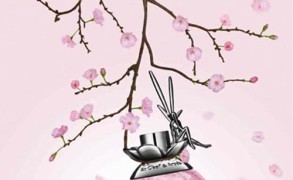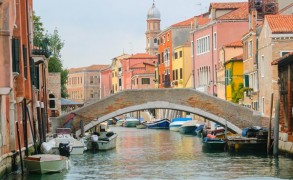For the Persian New Year and the vernal equinox, the first day of spring, I would like to take you to a secret garden with thousands of blossoms and thousands of scents. The passage will be provided by the twelfth-century Persian poet Nezami, who described this enchanting place in his poem Haft Peykar, The Seven Beauties.

Nezami (1141-1209), also known as Nizami Ganjavi, lived in the city of Ganja, the area of Azerbaijan that was part of the Persian empire until the 19th century. Like most poets of his day, Nezami had skills in various branches of arts and science. He was a philosopher, a mathematician, an astronomer, a historian, and a botanist, to name only a few fields in which he was skilled, and his marvelous erudition and knowledge of Persian literature and folklore make his works vivid.
The Haft Peykar is the story of the Sasanian ruler Bahram-e Gur, who discovered a mysterious palace with seven portraits of seven beauties. He resolved to find them and win them over, and after a series of adventures, Bahram-e Gur does that, installing his beauties in seven splendid palaces, each with its own color and theme. The story doesn’t end with the king and queens living happily ever after, however. The hero has to learn a lesson on justice, fairness and responsibility.

The story of each princess is full of sensuous and lush details, scents, tastes, colors, sounds. The seven colors–one of which is sandalwood–represent seven stages of love, human as well as divine. The garden to which Nezami will lead us is from a section called “The Black Dome,” where lives the Indian princess, governed by the planet Saturn. The concept of planets is also important in Nezami’s work, and it’s only fitting that in our universe there exists a small plant called 3770 Nizami in honor of the poet.
Should you wish to read the full version of The Haft Peykar, I recommend the English translation by Julia Scott Meysami. Nezami may not be as well known today as Rumi, but his poetry has influenced the world literature and other arts. Goethe was inspired by his images as he wrote his West–östlicher Divan. Giacomo Puccini’s opera Turandot is based on the story that Nezami’s Princess of the Red Pavilion narrates to Bahram-e Gur. Finally, Eric Clapton’s hit “Layla” is named after a character in Nezami’s Layla and Majnun. Centuries after it was written, The Haft Peykar remains a beguiling work that asks big questions about the world–what is the meaning of love, what is justice, and how to stay true to oneself.
As you read the excerpt below, savor each line, imaging the place Nezami describes, with its hues and scents that become more layered the further down the garden path you proceed. May your spring be just as resplendent.
I saw a garden pure as paradise
Untouched by human dirt and human vice:
Thousands of blossoms bloomed, and small streams crept
So gently through the leaves you’d say they slept;
A myriad of different hues lay mingled there,
A myriad scents drenched miles of perfumed air;
The rose lay in the hyacinth’s embrace,
The jasmine nuzzled the carnation’s face,
The blushing Judas blossoms kissed the grass–
The sand seemed glittering grains of polished glass,
The dust was camphor and the grave lay
Like shining jewels strewn in the wanderer’s way.
The flowing streams seemed rose-water that showed
Smooth beds where precious pearls and agates glowed–
Quick in their midst slim fish slipped playfully
Like silver coins in liquid mercury.
A massive rampart of bright emerald green
Ran round the garden and enclosed the scene;
Its slopes were covered with thick, shady trees,
Tall, noble poplars, slender cypresses.
(Its stones were rubies and when autumn came
The poplars’ leaves glowed with the selfsame flame.)
Sweet sandalwood and aloe trees grew there
Censing with fragrance all the garden’s air.
Finding this lovely place I knew the pleasure
Of one who stumbles on a hidden treasure:
Astonished by such gorgeous wealth I praised
The world’s great God, and the explored–amazed
And feeding on delicious fruit–each sight
That opened like a vista of delight.
Until at last light-hearted, tired, I lay
Beneath a cypress; there I passed the day
Till nightfall came, surrounded by such beauties
That I forgot the world and all its duties;
I slept and ate, gave thanks to God, and then
Contentedly I slept and ate again.
First image by Bois de Jasmin, second–Bahram Gur and the Princess in the Black Pavilion, Persian miniature circa 1590.













35 Comments
Emilie: Oh what a beautiful poem! Thank you for taking me to this resplendent garden 🙂
I love this repeating imagery, seven beauties in seven palaces, each a different hue. I’m looking forward to exploring Nezami’s work. March 21, 2018 at 8:15am
Victoria: I usually quote this poem when I’m told that it’s hard to describe scents in words. 🙂 March 22, 2018 at 5:17am
Emilie: A very eloquent comeback 😉 March 22, 2018 at 8:16am
Victoria: Maybe not so eloquent, but impassioned. It’s such a false notion that one can’t describe scents. After all, so many of us commenting here do it well enough. March 22, 2018 at 1:57pm
Emilie: That is very true. I don’t know why people say that because there are many examples of scent being described in literature, and not just in poetry or more florid prose. In most written works scent descriptions are woven in to create a sense of atmosphere.
Re-reading Brave New World there are SO many wonderfully evocative descriptions of scent and being a work of science fiction (though I realise this is a limiting label!) it may not seem a book where this particular detail of world building would be attended to. March 22, 2018 at 6:23pm
Victoria: Huxley definitely thought that scent was the trivial thing, which is why in his anti-utopia it plays such a big role, but at the same time he described scents really well. March 27, 2018 at 6:39am
Emilie: I didn’t know that and had not made the connection but that makes sense. His thoughtful descriptions do seem quite ironic now with this intent in mind. March 27, 2018 at 11:53am
Cathy B.: What a lovely poem! I just printed it out so I can enjoy it again and again!! It is a sharp contrast to the eight inches of snow that has already covered our yard but is nonetheless quite beautiful!! March 21, 2018 at 9:55am
Victoria: Yesterday was cold but sunny here. Today, on the other hand, the winter has returned. Stay warm! March 22, 2018 at 5:17am
briony: Thank you, Victoria. I love your book recommendations, poetry, cookery, all of them . . . and have bought many as a result. This one’s going on my list right away. March 21, 2018 at 10:29am
Victoria: So happy to hear this! March 22, 2018 at 5:17am
Trudy: Just beautiful Victoria. Especially lovely to read on this rainy Southern California morning. Thank you. March 21, 2018 at 10:54am
Victoria: I’m very glad that it brightened up your rainy day. March 22, 2018 at 5:18am
Susan: Thank you, Victoria, for sharing this lovely Spring gift with each of us.
Such exquisite images in Nezami’s poetry. March 21, 2018 at 11:40am
Victoria: The story of each princess is full of such vivid images and colors. It’s such a beautiful work. March 22, 2018 at 5:20am
Maggie M: So inspiring! Thank you for bringing the work of Nezami to light. Amazing how Persian poetry is still relevant despite the centuries, limitations of language and culture. March 21, 2018 at 12:06pm
Victoria: Very true! It still retains its beauty and colors. March 22, 2018 at 5:21am
sandra: Happy Nowruz Happy Spring!
Was thinking of the BdJ blog when I prepared my feast..I made your marinated olives and Shirin Plov rice dish..I also made 2 other dishes and a dessert! What a feast!
Thank you for this post!!! What a lovely passage to start the Persian New Year with… March 21, 2018 at 12:27pm
Victoria: What a feast indeed! Which two desserts did you make? March 22, 2018 at 5:22am
Sandra: Appetizer : your marinated olives serves with flatbread to dip in the sauce
Main Course: your Shirin Plov, Kookoo Sabzi and Mast o Khiar
Cheese course
Dessert was your persian rice cookies and Muhallabiyeh
A lot of food..but we had a lot of adults! Managed all of this with 2 littles ones to boot!
Did you make any special dishes?
It snowed here on the first day of spring, made me think of the novel Spring Snow. I need to find more novels similar to that love story.. March 22, 2018 at 8:19am
Victoria: It sounds like a real feast! You’ve done so much. A charming Persian expression is “my place was empty,” meaning I would have loved to be there, at your table.
We had those same marinated olives, fish stuffed with herbs and walnuts, chicken with spinach and sour plums, rice with fava beans and dill, tomatoes stuffed with the same mixture as fish and baked in the oven, a platter of herbs, and a platter of pickled vegetables. I was so full, I didn’t even try the tomatoes yet, but others liked them. For dessert, we had chocolate and kolompeh Kermani, small pastries filled with dates.
I put pictures on my Facebook page and Instagram, in case you want to take a look. March 22, 2018 at 2:02pm
sandra: Do you have the recipe for your stuffed tomatoes?
I took a peek at your instagram and it was such a feast! March 22, 2018 at 2:27pm
Victoria: Not in English, so I will have to translate it later. Basically, you make the same mixture as for mahi shekam por (stuffed fish) and use it for either eggplants or tomatoes. The dish is called bademjan kebab (or gojeh kebab for the tomato version). A great vegetarian dish. I baked mine, but it’s usually fried. March 22, 2018 at 4:48pm
Kamila Aubre: So beautiful! Poetry is one of the best expressions of spring. Happy Navruz! March 21, 2018 at 4:20pm
Victoria: Happy spring to you too! March 22, 2018 at 5:22am
Amalia: That I forgot the world and all its duties;…Happy Spring Victoria! Diptyque has released two new perfumes, Tempo an ode to the patchouli and Fleur De Peau, a tribute to musk -from what I read- Is it possible to smell them and tell us your opinion? Thank you. March 21, 2018 at 7:03pm
Victoria: I’ll see if I can get a hold of those samples. March 22, 2018 at 5:22am
zephyr: A gorgeous picture of this garden is in my mind. “Smooth beds where precious pearls and agates glowed” – love this. And all the different scents – I’d be delirious! Thank you! March 22, 2018 at 12:25am
Victoria: Yes, imagine–roses, daffodils, agarwood, sandalwood… March 22, 2018 at 5:23am
Rachel: Happy Spring to you! Poetry is a perfect way to start it. March 23, 2018 at 8:27am
Victoria: Thank you, Rachel! March 27, 2018 at 6:40am
Deborah H: I was just reading the Introduction to one of my favorite cookbooks “The New Persian Kitchen” by Louisa Shafia and she quotes this same lovely poem. It seems like you enjoy cooking (and Persian culture) and I think that this cookbook might be something you would appreciate. Wishing you and your family a wonderful Spring ahead! March 24, 2018 at 6:34pm
Victoria: Thank you, Deborah. Louisa Shafia’s book is wonderful. There is another cookbook, in which the poem is quoted and where I learned of this particular translation–Najmieh Batmanglij’s The Food of Life. It’s a classic among the English language Persian cookbooks, and for the authentic, traditional recipes, it’s excellent. March 27, 2018 at 6:58am
Aurora: A real garden of delights in the poem. How I love hyacinths and your photo is a blue symphony, More prosaically I was very interested in the stuffed tomatoes too! March 25, 2018 at 5:09am
Victoria: I will have to translate it. I love the combination of tomatoes and walnuts. March 27, 2018 at 6:59am